In order to start an online business, you must first choose an eCommerce platform. There are many eCommerce platforms out there, but Magneto is by far the best choice. Magento eCommerce is a flexible and customizable platform that helps businesses develop online stores. Magento offers three different versions to accommodate businesses of various sizes, from start-ups to large companies. Moreover, Magento’s architecture is designed to be user-friendly and give you control over the design and operation of your store. If you’re looking for an eCommerce platform that can help you launch your online business, Magento is definitely a great option to consider.
What Is Magento?
Magento is an online eCommerce platform owned by Adobe that’s designed to build a multichannel experience for B2B and B2C customers. What sets Magento apart from other platforms is its extensive product management and ability to maintain over one million products, helping businesses expand their catalog as they grow.
Built on open-source technology, Magento is hosted on-premise or through cloud hosting services like AWS, Azure, or Google Cloud. Whether you are looking to launch your first eCommerce store, or want to migrate to a better platform, Magento eCommerce can help you reach your business goals.
As a feature-rich platform, it streamlines eCommerce operations and provides sellers with ready-to-use marketing, search engine optimization (SEO), and product management, among other capabilities.
Why Is Magento so Popular?
Magento is a well-known eCommerce platform for good reason: it provides a user-friendly interface, simple third-party integration, responsive web design, many deployment options, and a simple buying experience for customers.
What Is Magento 2?
The Magento 2 update is the latest release from the developers. This system undergoes periodic updates, with Magento 2 being one of the most significant updates to date.
Magento 2 provides users with a variety of powerful features, including:
- Increased business efficiency
- Responsive website design
- 50% quicker loading times
- Improved User Experience
- More financial security
Magento 2 is the most recent version of Magento, and it represents a significant advance over the previous version. Developers extensively redesigned the platform to make it quicker and more scalable, taking user comments into account. Whether you’re looking for a faster, safer, or more scalable website, Magento 2 is the way to go.
What Are Magento’s Key Features?
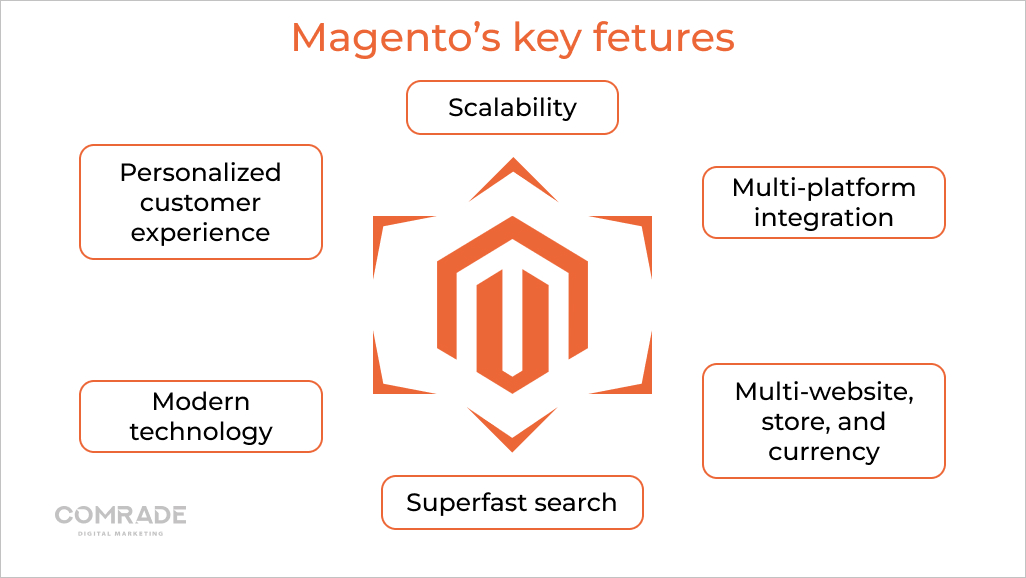
Magento possesses an impressive list of prominent capabilities that offer brands outstanding benefits and make it one of the more competitive commerce options available:
- Scalability: Magento suits businesses of all sizes, selling 100 to more than 100,000 different products. It’s scalable and continuously releases new features to meet eCommerce and customer demands.
- Multi-platform integration: By allowing integration from third parties, online owners have full control over integrating their store with other selling or payment gateways and add-ons.
- Multi-website, store, and currency: It’s easy to set up additional websites using catalog subset and design variations, reducing the cost of running multiple websites.
- Superfast search: Magento Enterprise uses improved search technology called Elasticsearch that helps customers find the right product quickly.
- Modern technology: The latest version (Magento 2) is compatible with the latest technologies like PHP 7, which means faster load times with fewer server resources and, therefore, lower hosting costs.
- Personalized customer experience: Effective customer segmentation according to target audience behavior, and the ability to promote product lines based on these segments, provides more targeted promotions and effective conversions.
What Are the Benefits of the Magento Ecommerce Platform?
A quarter of a million merchants rely on Magento to run their business. It is the third most popular eCommerce platform around the globe due to its extensive array of powerful tools for building and managing online stores.
Magento Is Highly Customizable
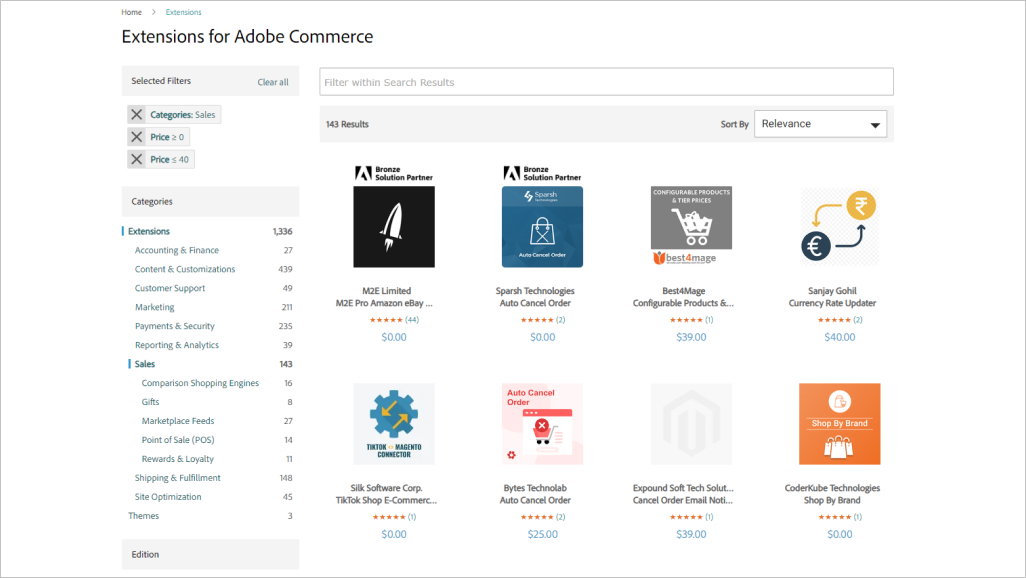
Besides the general appearance of your Magento eCommerce store, the Magento platform allows you to choose from a variety of shipment, payment, and language options to accommodate your customers. With the right Magento developer, almost any functionality you can imagine is possible.
Because Magento is an open-source platform, most of the functionality you’ll want likely already exists in the form of plugins (third-party extensions). Some of these plugins provide solutions for accounting, payment, processing, and other common needs, and many are free.
How Many Extensions Does Magento Have?
With over 5000 plus extensions and templates, Magento’s extensive adaptability and customization ensure businesses remain competitive. However, it’s important to know that the greater the level of customization required, the higher the chances you will need to hire a Magento developer because much will need to be coded from scratch.
Although there are a few themes available, it’s almost always better to opt for a professional developer if you want your Magento website to be truly unique. There are many software solution companies, like us, that have sufficient experience and proven track records in building custom applications to sell online.
Magento Is Optimized for Mobile
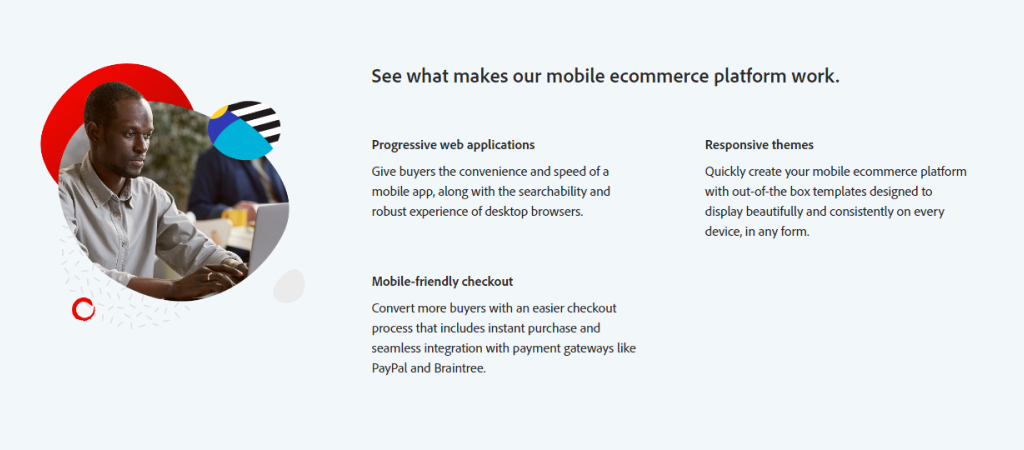
Magento is mobile-friendly platofrm, contributing to a higher ranking website ranking in search engines. Especially Google, since it evaluates the mobile site version first. Today, smartphones are the primary gadgets consumers use to go online, so mobile optimization is the rule, not the exception, for eCommerce.
Magento offers a mobile-first orientated platform with responsive design. It displays essential features but does a better job at figuring out what they are, meaning smartphone users won’t feel misinformed or have trouble getting to the products they want.
Magento also has a more consistent UI between desktop and mobile website versions. Because of this, it’s much easier to adapt your eCommerce store for multiple devices.
Additionally, it is compatible with Google Analytics, so you can customize tracking parameters, which you can do in the Magento admin panel. Currently, this is one of the most convenient ways to monitor target audience behavior.
Magento is Good for Lead Conversion
The updates made to Magento mean your eCommerce store is more likely to convert visitors than before. Because mobile users tend to spend more, it’s important you offer them a mobile-friendly experience that encourages them to make a purchase.
A mobile-friendly website in today’s market is essential to drive your eCommerce business forward, as eCommerce dollars now comprise 10% of all retail value. An eCommerce store optimized for mobile makes your store appealing, user-friendly, and easy to navigate irrespective of the device used and its resolutions.
Magento Supports Worldwide Expansion and Shipping
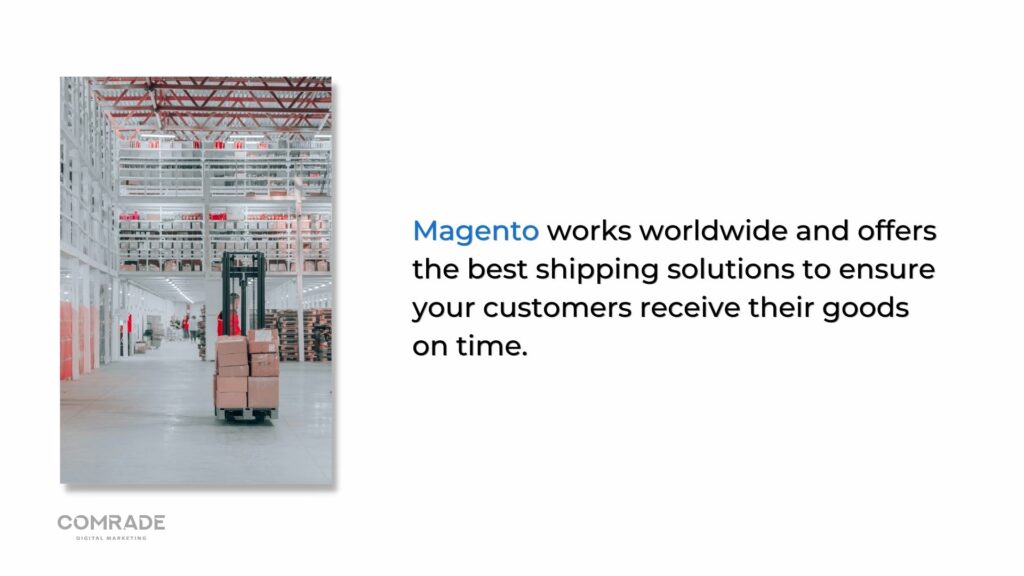
Magento offers international retailers multi-store functionality. This allows you to run several stores or channels from a single admin interface. Therefore, localized sites per market can be managed from one space, while sharing the same backend and codebase.
These sites can also share customer data or remain separate according to different customer groups. Each website, store, or store view affords flexibility regarding pricing, tax, and shipping.
Shipping methods and shipping providers are of great importance to eCommerce operations. Magento works worldwide and offers the best shipping solutions to ensure your customers receive their goods on time.
As a global platform, it offers flat rates, free shipping, table rates, and online rates. You can base the rate on a minimum purchase or set up a shopping cart price rule that applies when a set of conditions are met.
One of the main advantages of Magento is it is pre-integrated with the world’s most popular shipping providers, such as DHL, UPS, FedEx, USPS, and more. To enable these services, all you have to do is enter specific data from your service provider and configure the settings accordingly.
Magento Can Integrate With Different Platforms
Painless integration with third-party services simplifies the process of adding new functionality or upgrading an existing one. Magento easily integrates with Google, Salesforce, PayPal, Sage Pay, all major social media, and other commercial applications to help you run a successful commerce business.
Magento offers solid integration for so many third-party extensions that bring several benefits to store owners, such as:
Secure Payment Gateways
With Magento, customers can opt for redirect or direct payment gateways; The former takes the customer to a secure payment page hosted by a Payment Service Provider (PSP), while the latter allows all payment processing to be done on-site.
Shipping Software Integration
The shipping process can be exhaustive, to begin with. As such, there are many third-party and platform software integrations available to streamline the following:
- Order management
- Automated shipping
- Price comparison
- Printing labels, packing slips, etc.
- Inventory management
- Shipment tracking
- Reporting and analysis
Customer Relationship Management (CRM) Systems
Magento CRM systems can help merchants enhance customer engagement by gathering data, building customer loyalty, and devising a functional approach to better sales and marketing. Some CRMs that Magento is compatible with include HubSpot, Metrilo, Salesforce, and Zoho.
Social Media Integration
Social media management is a vital component of digital marketing. Besides supporting a number of social media integrations, Magento 2’s social login extension can increase the number of your registered customers by providing a registration shortcut that allows logins via social networks.
Therefore, your visitors can use Facebook, LinkedIn, Twitter, and Google for rapid registration. Other integrations like Magento Social are a good free option, as well as MiniOrange and Magestore, which help utilize the potential of your eCommerce social media accounts.
Customer Support Systems
More than 65% of people have higher expectations for customer service today than they did three to five years ago. This reveals a lot about the kind of service your target audience expects.
Thankfully, help desks and live chat are compatible Magento integrations, which streamline customer service response and solution times.
Customer support systems provide assistance to customers with everything from making online purchase decisions to resolving issues while creating a seamless customer experience across channels and platforms.
Magento Has Free Community Support
Adobe Commerce offers support tools to help Magento commerce merchants improve their user experience. From best practices and troubleshooting, their Magento forums share tips and solutions to get your store running perfectly for those who use the free version.
Driven by a global community of developers, Magento’s 360,000+ forum members provide proper guidelines and solutions for particular challenges. Made up of eCommerce developers, bloggers, designers, project managers, and the likes, rest assured, the developer support available is grounded in practical application.
Magento Provides Reporting and Analytics
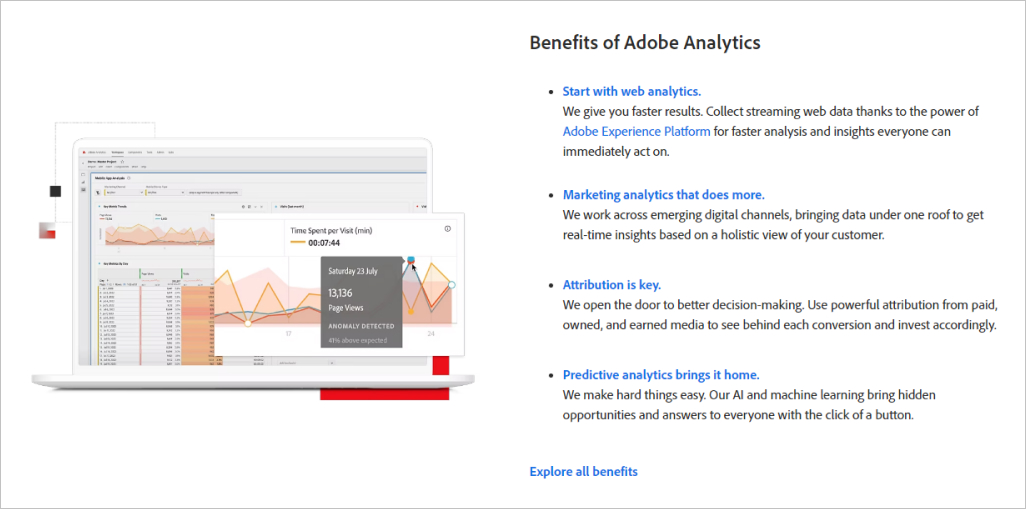
Magento’s platform is integrated with Google Analytics to provide detailed reports containing insights that can be incorporated into your digital marketing strategy. Its report overviews function makes it easy to read or send reports with minimal effort.
Dynamic reports can be created for different uses, such as:
- Coupon usage report
- Tax reports
- Search terms report
- Best viewed products report
- Abandoned shopping cart report
- Sales report
These reports are based on product, order, and customer data. While the platform’s Advanced Reporting uses Magento Business Intelligence for analytics, you don’t have to have a Magento Businesses Intelligence account to use it.
With Magento, you can get a high-level idea of how your store is performing. You’ll know where your customers came from, who they are, and what they bought on a single platform. This makes it super convenient to track revenue, net profit, refunds, discounts, profit margins, conversion rates, and more.
Magento Is SEO-Friendly
When an eCommerce store is SEO-friendly, it means that Google and other search engines can crawl each page efficiently, interpret its content, and index it in their database. Once indexed, they can serve the most relevant and valuable web page to their users based on the topics users search for.
Consumers will not find your business online unless you rank on the first search results page (SERP). In fact, 75% won’t scroll past the first page! Luckily, Magento is well-built for SEO. It has great features for robots.txt files, sitemap.xml, and multiple ways to redirect pages.
How Can Magento Improve Ecommerce SEO?
With Magento’s SEO capabilities, you’ll attract more traffic and sales because it provides:
- Metadata for homepages, product/category pages, rich snippets, and prefixes and suffixes for title tags.
- Canonical tags and unique category paths for product URLs to avoid duplicate content.
- SEO-friendly URLs and redirects.
- Robots.txt file and XML sitemaps.
And these SEO benefits will help your store get on Google, Bing’s, and other search engine’s radars because:
- They allow you to improve store positions in SERP.
- They boost website traffic and visibility.
- They increase the authority of your products, categories, and other website pages.
- They make your online store more discoverable and linkable to other authoritative sites.
- They increase your store’s conversion rates by matching its keywords with customer intent.
The best thing about the Magento commerce platform is you don’t need to add further extensions or modules; everything is already built-in.
How Much Does Creating a Magento Store Cost?
There is no getting around the fact that Magento eCommerce website costs money. Unless you’re doing everything yourself with a simple plug-and-play solution, you’re looking at paying anywhere between $5000 to $55,000 to support a website with 100 to 1000 products, which includes design, development, and any other commerce customization.
The cost depends on the amount of functionality and customization you need over the original core features, and the number of integrations required, i.e., product information management (PIM) and customer relationship management (CRM). Magento offers several work models for it’s platform:
| Pricing Scheme | Key Features | Pros |
| Magento Open Source (formerly Community Edition) | – Basic e-commerce functionality – Customizable – Community support – Limited scalability |
– No licensing fees – Ideal for small businesses – No revenue-based costs |
| Magento Commerce (formerly Enterprise Edition) | – Advanced e-commerce features – Enterprise-grade support – B2B capabilities |
– Enhanced performance – Scalability for large businesses – Advanced marketing tools |
| Magento Commerce Cloud | – Hosted in cloud environment – Automated cloud management – Staging and deployment tools |
– Auto-scaling for peak loads – No need for separate hosting – Reduced IT management efforts |
| Magento Order Management | – Advanced order processing – Inventory and fulfillment – Customizable workflows |
– Centralized order management – Improved customer experience – Streamlined order operations |
| Magento B2B Commerce | – B2B-specific features – Account management – Personalized catalogs |
– Enhanced B2B e-commerce – Improved customer relationships – Streamlined procurement |
Today we are going to take a closer look at two most popular models for working with magento: Open Source and Magento Commerce
Magento Open Source
The Magento Community Edition is free to download, modify and edit any files, code all store data, and host anywhere. Its fantastic feature set lets merchants launch modest businesses and test the platform’s capabilities before upgrading.
However, just because the software is free doesn’t mean there aren’t costs. To build the store and make it live, you’ll still need to pay for your store’s domain, hosting, designing, and development which costs roughly $15,000 +.
The Advantages:
- Free, open-source, and no licensing fees are required
- Scalable and flexible
- Rich features and great functionality. It has everything needed to build a successful store.
The Disadvantages:
- Requires technical (coding) expertise
- Limited Magento support options: While community support is available, there is no official customer support from Magento
- Some features and add-ons come at an additional cost.
Magento Commerce
The Magento Enterprise Edition’s licensing fee alone starts at $22,000 annually for merchants making less than $1 million per year and increases up to $125,000 for those generating $25-$50 million in revenue.
The major difference between this and the free version is the level of technical support. With the Community Edition, the technical aspects and security are managed by the owner, whereas the Enterprise Edition helps owners at every step.
You also have the option to upgrade to the Magento Enterprise Cloud Edition (pricing starts at $40,000), which provides managed infrastructure services, high security, optimized performance, smooth integration, and scalable web storefronts.
Magento Enterprise and Cloud Editions aren’t cheap. Factor in other costs like hosting and web development, and you’re probably looking at between $30,000 to $50,000.
The Advantages:
- Includes everything the open-source version has
- Comes with official support from Adobe’s staff
- Advanced scalability and performance, which is great for large businesses with high traffic volumes
- More payment options that include out-of-the-box integrations with popular payment gateways.
The Disadvantages:
- Licensing starts at $22,000 a year
- Requires even more technical expertise, not ideal for non-coders.
Is a Magento Store Worth the Cost?
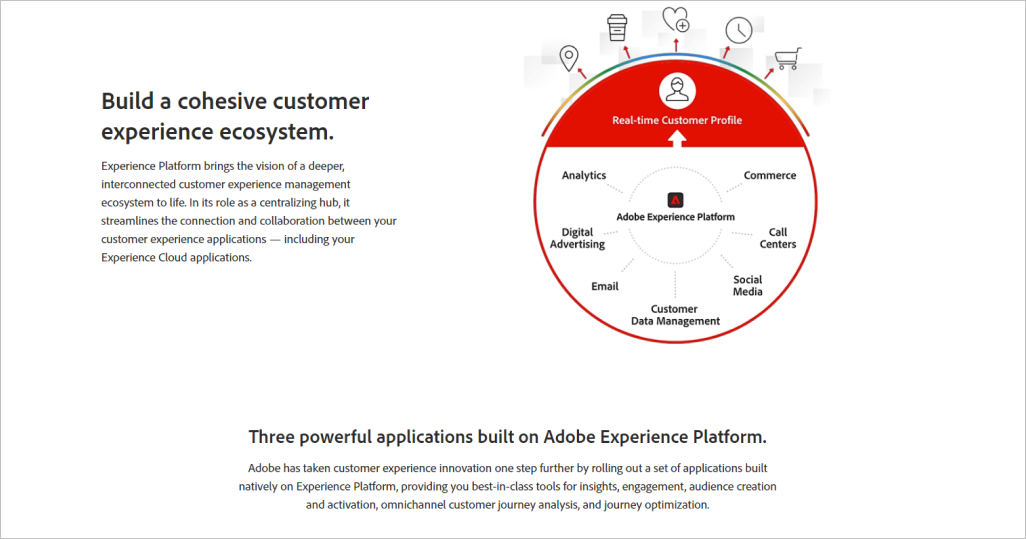
Saving resources, optimizing strategies, and improving user confidence are just some of the reasons why you should invest in a professional eCommerce platform. Not to mention the cash you can save by not spending money on brick and mortar stores.
Of course, you need to select the appropriate version for your business needs. A small business that doesn’t require upgraded performance capabilities is advised to go with the Community Edition, and large companies making more revenue (between $5-$25 million) should naturally opt for the Enterprise version.
Magento pricing may seem expensive at the beginning; however, the maintenance is relatively inexpensive over the long term. As marketing experts, we can attest the cheapest option is rarely the best.
And here’s the crux: If you get it done right the first time with the right kind of platform like Magento, you save time, money, and lots of hassle down the road.
For those on a budget, starting small and adding customizations and functionality as the business’s demands grow is the best way to use the platform without being overwhelmed by upfront costs.
Can I Set Up a Magento Store Myself?
Do you want to take on the role of the frontend developer, designer, project manager, and development operations manager, among whatever else is needed to launch your own website?
If you answered no, then we strongly advise hiring experts to ensure your website is built correctly from the beginning. Think about it like this: You wouldn’t build or rent a shoddy physical store, so why do so for your digital infrastructure?
Magento requires the right team with knowledge of all the basic programming languages like Java, Python, Javascript, CSS/HTML, C++, PHO, SQL, and Ruby, among others. A Magento developer must have mastered PHP language to be considered a qualified and professional developer.
In all honestly, unless you are a developer, you probably won’t have the right skill set to leverage the platform’s benefits, which will just result in a steep learning curve of wasted time, troubleshooting, and frustration.
And yet, there is a solution.
Hire Comrade Digital Marketing Agency!
We have more than a decade of experience in eCommerce and specialize in custom web development for Magento.
Our certified team offers:
- Custom Magento development: From web design to digital marketing and store maintenance, we are equipped to service all eCommerce needs.
- Migration from Magento 1 to Magento 2: We seamlessly migrate stores, so businesses can leverage new technologies.
- Third-party integration services: Whether it’s adding payment gateways or CRMs, we find the best solutions.
- Ecommerce SEO: Our SEO strategies enable maximum visibility on search engines with a 55% average increase in transactions.

Create a Better Magento Storefront with Comrade
If you want to explore whether Magento is right for your business, we can help. As a data-driven, results-orientated team, we’re trusted by hundreds of clients to deliver excellent service and provide realistic offerings.
Providing quality Magento development services can be the difference between failure and success. Comrade Digital Marketing Agency will ensure that your website appeals to customers and runs smoothly for as long as your commerce store lives online. Contact us to chat about your Magento commerce possibilities today!
Frequently Asked Questions
Where do you operate?
Comrade originates in Chicago, but we worked all around the United States. We can help your business grow and increase revenue whenever you are. We have offices across most major cities in the US. For example, we can offer digital marketing services in Denver or Miami. You can even find our internet marketing experts in Austin! If you want to know more about our Cincinnati digital marketing agency or find out how exactly we can help you, contact us via the phone or email.




